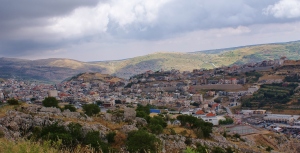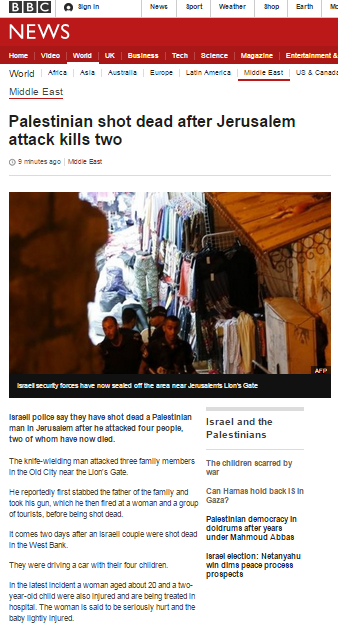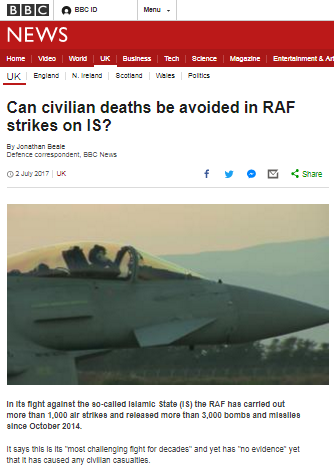In part one of this post we saw how, on a visit to the Golan Heights, ‘Newshour’ presenter Tim Franks purported to interview a resident of the community set to be expanded and renamed after the US president. [emphasis in italics in the original, emphasis in bold added]
Franks: “He lives in this tiny hamlet and tonight he’s got a meeting with government officials about their plans to build a new settlement on his village’s land and name it in honour of Donald Trump.”
As we showed, the man concerned does not live in Beruchim and that meeting was not with “government officials”.
Following that interview, Franks’ long report (from 30:06 here) in the May 22nd afternoon edition of ‘Newshour’ continued with a trip to Majdal Shams which he insisted on describing as a “village” even though it has over 11,000 residents and once again using the term “Syrian Druze” despite the fact that by no means all of the Golan’s Druze residents identify as such.
Franks: “You get a different view further north in the Golan Heights. In this Druze village – Majdal Shams – you literally get a different view because you can see from its slopes into Syria. For decades this frontier marked by this sinuous ceasefire fence was the quietest that Israel had. That changed with the Syrian civil war. Militant Islamist groups and Iran building up a presence just the other side of these hills. […] So what does this leave the Syrian Druze in Majdal Shams feeling? One good place to try to get a thoughtful response is the owner of the local bookshop, Amal Safadi.” […]
Having already signposted his interviewee’s response and once again failing to inform listeners that Israeli law was applied to the Golan Heights 38 years ago, Franks went on:
Franks: “With the American announcement that they would recognise the Israeli annexation of the Golan Heights, what’s your attitude towards the idea of the local people here taking Israeli citizenship? Have you taken Israeli citizenship?”
Franks obviously must have known the answer to that ‘question’ before he asked it. Safadi has made her views clear in other media interviews (as have some members of her extended family) and she was obviously selected in advance by his production team to represent a certain side of the story. Listeners heard a translated version of her responses in Arabic.
Translator: “She says I will never think to take the citizenship. Our citizenship as Syrians is historical. We’re here from thousand years. This decision is political: nothing will change on the ground.”
Franks did not bother to try to clarify where “here” is and hence avoided the need to remind listeners that Syria as an independent state came into existence in 1946 or tell them that Majdal Shams was settled in the 18th century.
Franks then brought up imaginary scenarios which have not been proposed by any Israeli official either recently or in the past 38 years since the Golan Heights Law was passed.
Franks: “If the Israeli government decides now that you have to take citizenship or maybe they will say you don’t deserve all the rights of living here.”
Translator: “She is saying we had the same story in 1982 and they tried to force us to take the citizenship. Even we were less educated by then but now we are more stronger and our decision will be more strong these days.”
Franks: “People around the world listening to you might understand that you’ve got a very strong sense of identity – that you are a Syrian Druze – but they’ll also say just look over there inside Syria where there’s chaos, there’s conflict. At least here you’ve got rights and you’ve got relative prosperity as well. Why aren’t you happy to be here and take the advantages that Israel can give you?”
Translator: “She says you have a mother, right? If your mother is sick will you leave her? No, you will stay there and support her. Syria is our mother and we need to support our mother instead of leaving her.”
Making no effort to get beyond Safadi’s slogans and examine factors such as the relevant fact that many Druze residents of the Golan Heights have relations in Syria for whose safety they fear, Franks next told listeners that “elsewhere in Majdal Shams though, the taboo is beginning to crack”.
In fact there has been a rise in the number of Golan Druze applying for Israeli citizenship since the Syrian civil war began in 2011.

Franks then interviewed a Majdal Shams resident who did so two years ago.
Franks: “He needs it, he says, so he can travel more easily for work and also so that once abroad, he doesn’t get hassled or intimidated for having no declared citizenship.”
After his interviewee had told him that opinions for and against the move among people he knows were “fifty-fifty”, Franks responded:
Franks: “I don’t really need to tell you this but the argument that is used by a lot of people here is that this is occupied territory; it doesn’t belong to Israel. One day it will go back to Syria.”
Following his interviewee’s reply to that and an additional question, Franks took the time to stress to listeners that his decision was “the pragmatic, non-ideological decision to take Israeli citizenship”.
The final section of Franks’ report was introduced with another undated reference to “annexation”, an unexplained reference to “strategic importance” and a misleading statement concerning water.
Franks: “So what’s driving the actions of the Israeli state up here? Given Israel’s decision to annex the territory, given the government’s delight at Donald Trump’s recent support for that annexation, given the Golan’s strategic importance, militarily and in terms of the country’s water supply, has there ever been serious thought to a territorial exchange with the Syrians? Well the answer is yes – all the way from the 1990s until as recently as the start of this decade. […] What stopped everything was – no surprise – the Syrian civil war.”
Franks’ final interviewee was former national security advisor Uzi Arad who explained how the war in Syria had led to “the notion that Israel would now forfeit” the Golan Heights looking “recklessly silly”. Franks was however far more interested in Arad’s assessment of “the American move”.
Arad: “Don’t press the point. Clearly this Assad is a real (bleeped out) as a person, as a leader. Clearly Syria needs something better but he had successfully won the nation and he has support to that from Russia. If you provoke him you would make him insist that for him the liberation of the Golan remains a priority. So why? Why pushing them into that corner? We stay there anyway.”
Franks then closed his report:
Franks: “The Golan is beguiling and beautiful. It’s also deceptive. The struggle with the Palestinians in the West Bank and East Jerusalem, in Gaza – that’s the most visible, most frequently violent manifestation of Israel’s uneasy place in the Middle East. But it’s away from them, up in the north, that the potential for the greatest conflict may come.”
In the years since the Syrian civil war began BBC audiences have seen reports from a number of BBC and other journalists visiting the Golan Heights, most of which have presented a drearily monochrome portrait of the Golan Druze that fails to reflect changes in their society. In addition to being blighted by basic inaccuracy and omission of relevant context, Tim Franks’ almost thirteen-minute-long report largely stuck to the same jaded political narrative and even promoted irrelevant and imaginary scenarios concerning the Israeli government.
Related Articles:
BBC’s Tim Franks in the Golan Heights – part one
BBC’s Tim Franks promotes falsehoods in ‘peace plan’ reports – part one
BBC’s Tim Franks promotes falsehoods in ‘peace plan’ reports – part two
Once again, BBC history begins in June 1967
BBC’s Golan Heights profile misleads on water and borders




